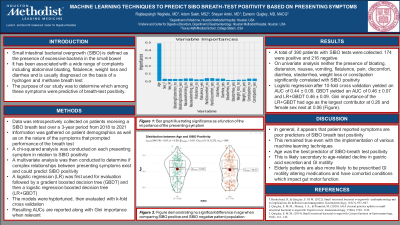Sunday Poster Session
Category: Small Intestine
P1243 - Machine Learning Techniques to Predict SIBO Treatment Response
Sunday, October 22, 2023
3:30 PM - 7:00 PM PT
Location: Exhibit Hall

Has Audio

Rajdeepsingh Waghela, MD
Houston Methodist Hospital
Houston, TX
Presenting Author(s)
Rajdeepsingh Waghela, MD1, Adam A.. Saleh, BS2, Shayan Amini, MD3, Eamonn M. Quigley, MD, MACG1
1Houston Methodist Hospital, Houston, TX; 2Texas A&M College of Engineering Medicine, Houston, TX; 3Houston Methodist, Houston, TX
Introduction: Small intestinal bacterial overgrowth (SIBO) is a common gastrointestinal disorder characterized by the presence of excessive bacteria in the small bowel. Rifaximin is regarded as the first-line agent of choice for SIBO. The purpose of our study was to determine if the pattern of gas exhaled during a hydrogen breath test and presenting symptoms were predictive of treatment response in SIBO. We additionally explored the association between treatment response and Rifaximin versus non-Rifaximin based SIBO treatment regimens.
Methods: Data was retrospectively collected on patients receiving a SIBO breath test between 2018 to 2021. Information was gathered on patient demographics as well as presenting symptoms. Additional parameters such as treatment type, and treatment response were recorded. A univariate analysis was conducted to determine features to include in the model with p-value < 0.3 required for inclusion. Given the imbalance in our dataset, a synthetic minority oversampling technique (SMOTE) with standard random forest (RF) was used as our classifier. After hypertuning and k-fold cross validation, the resulting AUCs and Gini importances are reported.
Results: A total of 174 patients with SIBO diagnosed on breath test were followed up after treatment and their treatment response recorded. 120 had symptom improvement while 54 did not. Collinear variables were removed manually. After univariate analysis, age, female sex, patient reported symptoms, and treatment type were incorporated as features of a SMOTE-RF classifier to identify predictors of treatment response. After k-fold cross validation and RF hypertuning, classification with SMOTE-RF yielded a mean AUC of 0.61 ± 0.03 (Figure). Gini importances showed age to be the most impactful predictor of treatment response with a score of 0.36 followed by female gender at 0.11. Neither presenting symptoms nor gas exhalation pattern were significant predictors of treatment response. Additionally, there was no apparent difference in symptom improvement when comparing rifaximin versus non-rifaximin based treatment regimens for treatment of SIBO.
Discussion: Based on our analysis, it appears that presenting symptoms are poor predictors of treatment response. Age remains the best predictor of treatment response. This stands true even with the implementation of various machine learning techniques. Machine learning optimization of various patient demographic and symptoms predictors proved generally unhelpful in predicting treatment response.

Disclosures:
Rajdeepsingh Waghela, MD1, Adam A.. Saleh, BS2, Shayan Amini, MD3, Eamonn M. Quigley, MD, MACG1. P1243 - Machine Learning Techniques to Predict SIBO Treatment Response, ACG 2023 Annual Scientific Meeting Abstracts. Vancouver, BC, Canada: American College of Gastroenterology.
1Houston Methodist Hospital, Houston, TX; 2Texas A&M College of Engineering Medicine, Houston, TX; 3Houston Methodist, Houston, TX
Introduction: Small intestinal bacterial overgrowth (SIBO) is a common gastrointestinal disorder characterized by the presence of excessive bacteria in the small bowel. Rifaximin is regarded as the first-line agent of choice for SIBO. The purpose of our study was to determine if the pattern of gas exhaled during a hydrogen breath test and presenting symptoms were predictive of treatment response in SIBO. We additionally explored the association between treatment response and Rifaximin versus non-Rifaximin based SIBO treatment regimens.
Methods: Data was retrospectively collected on patients receiving a SIBO breath test between 2018 to 2021. Information was gathered on patient demographics as well as presenting symptoms. Additional parameters such as treatment type, and treatment response were recorded. A univariate analysis was conducted to determine features to include in the model with p-value < 0.3 required for inclusion. Given the imbalance in our dataset, a synthetic minority oversampling technique (SMOTE) with standard random forest (RF) was used as our classifier. After hypertuning and k-fold cross validation, the resulting AUCs and Gini importances are reported.
Results: A total of 174 patients with SIBO diagnosed on breath test were followed up after treatment and their treatment response recorded. 120 had symptom improvement while 54 did not. Collinear variables were removed manually. After univariate analysis, age, female sex, patient reported symptoms, and treatment type were incorporated as features of a SMOTE-RF classifier to identify predictors of treatment response. After k-fold cross validation and RF hypertuning, classification with SMOTE-RF yielded a mean AUC of 0.61 ± 0.03 (Figure). Gini importances showed age to be the most impactful predictor of treatment response with a score of 0.36 followed by female gender at 0.11. Neither presenting symptoms nor gas exhalation pattern were significant predictors of treatment response. Additionally, there was no apparent difference in symptom improvement when comparing rifaximin versus non-rifaximin based treatment regimens for treatment of SIBO.
Discussion: Based on our analysis, it appears that presenting symptoms are poor predictors of treatment response. Age remains the best predictor of treatment response. This stands true even with the implementation of various machine learning techniques. Machine learning optimization of various patient demographic and symptoms predictors proved generally unhelpful in predicting treatment response.

Figure: SMOTE-RF ROC Curve for Mean AUC after Cross Validation
Disclosures:
Rajdeepsingh Waghela indicated no relevant financial relationships.
Adam Saleh indicated no relevant financial relationships.
Shayan Amini indicated no relevant financial relationships.
Eamonn Quigley: 4D Pharma – Consultant, Grant/Research Support. Cindome – Grant/Research Support. Novozymes – Consultant. Salix – Consultant. Takeda – Grant/Research Support. Vibrant – Advisor or Review Panel Member, Grant/Research Support.
Rajdeepsingh Waghela, MD1, Adam A.. Saleh, BS2, Shayan Amini, MD3, Eamonn M. Quigley, MD, MACG1. P1243 - Machine Learning Techniques to Predict SIBO Treatment Response, ACG 2023 Annual Scientific Meeting Abstracts. Vancouver, BC, Canada: American College of Gastroenterology.
